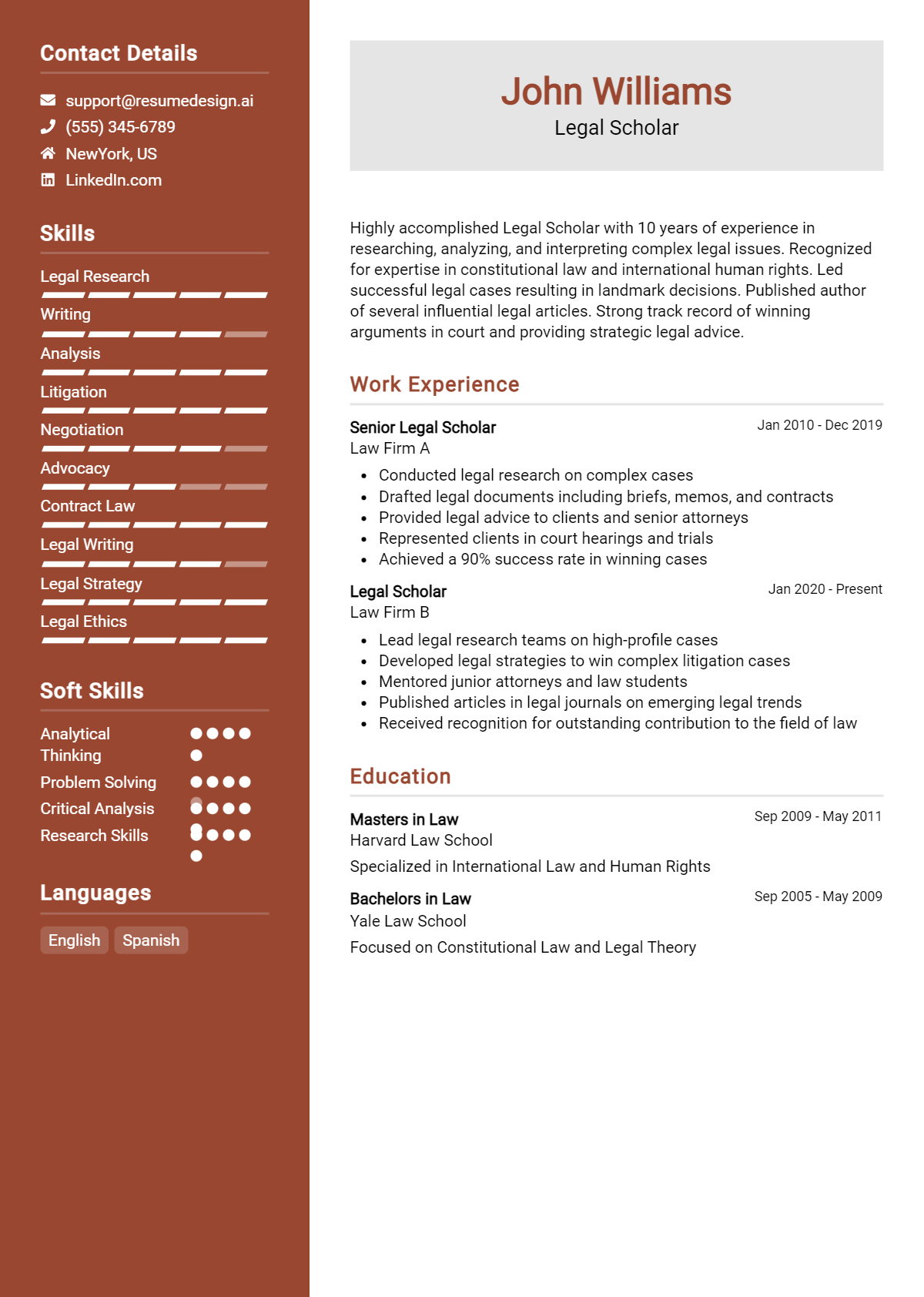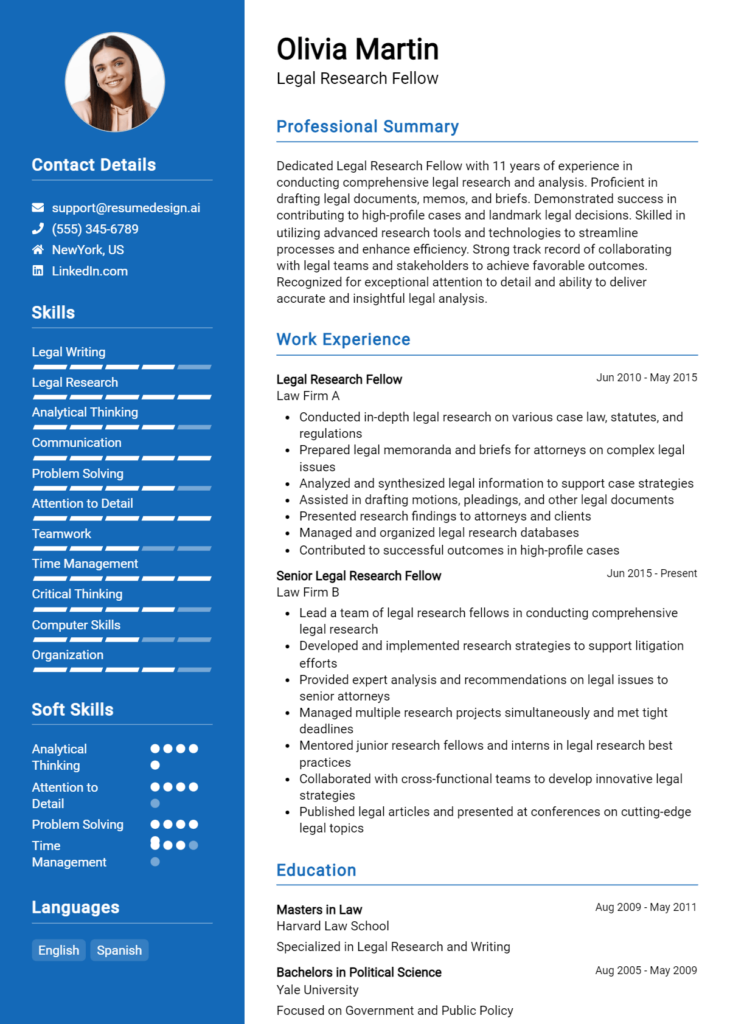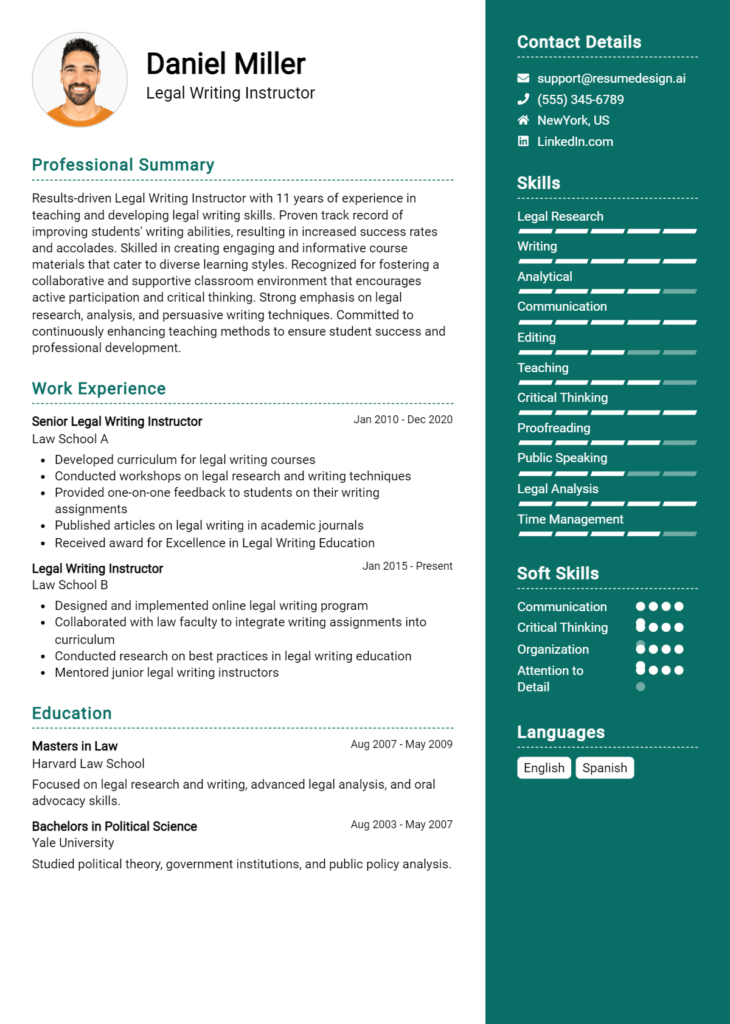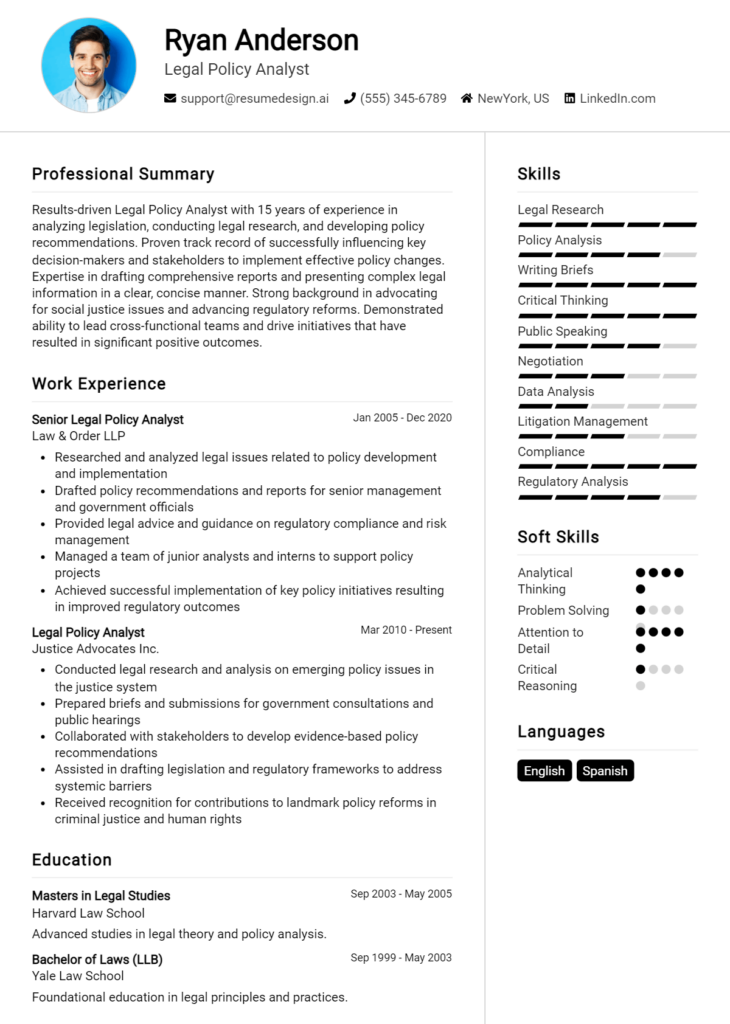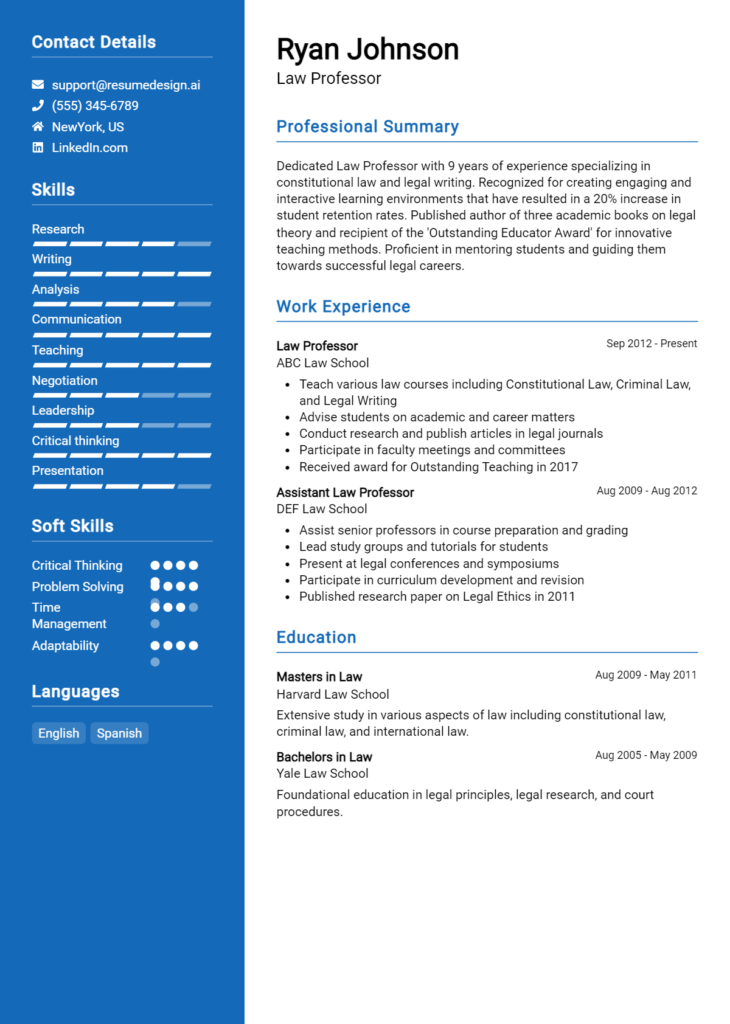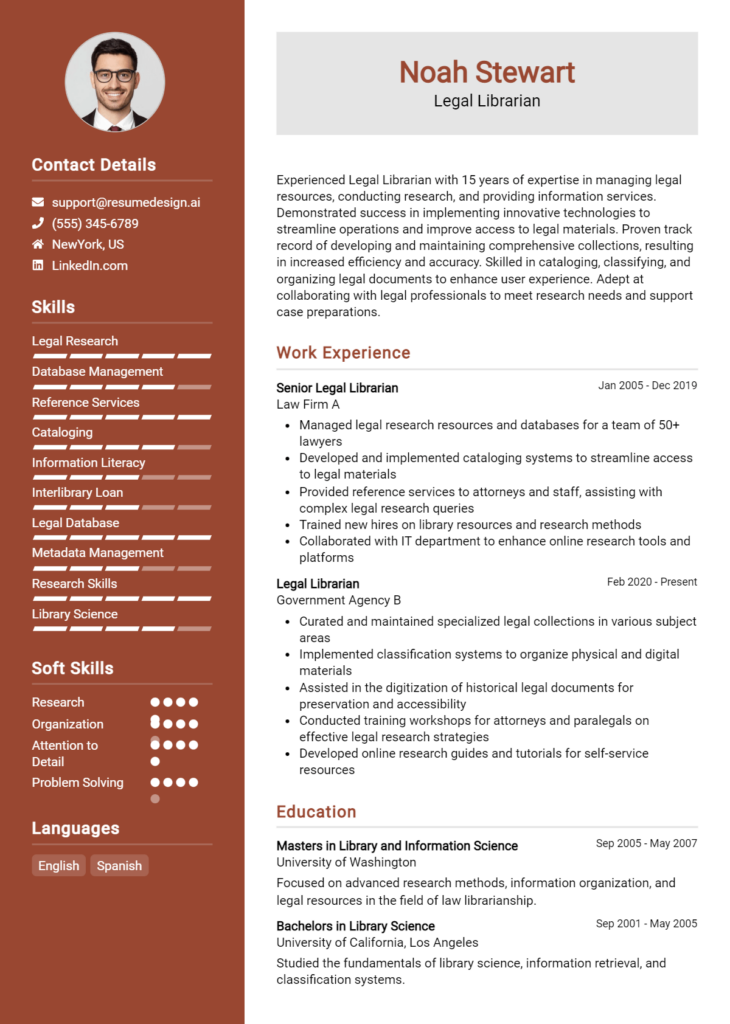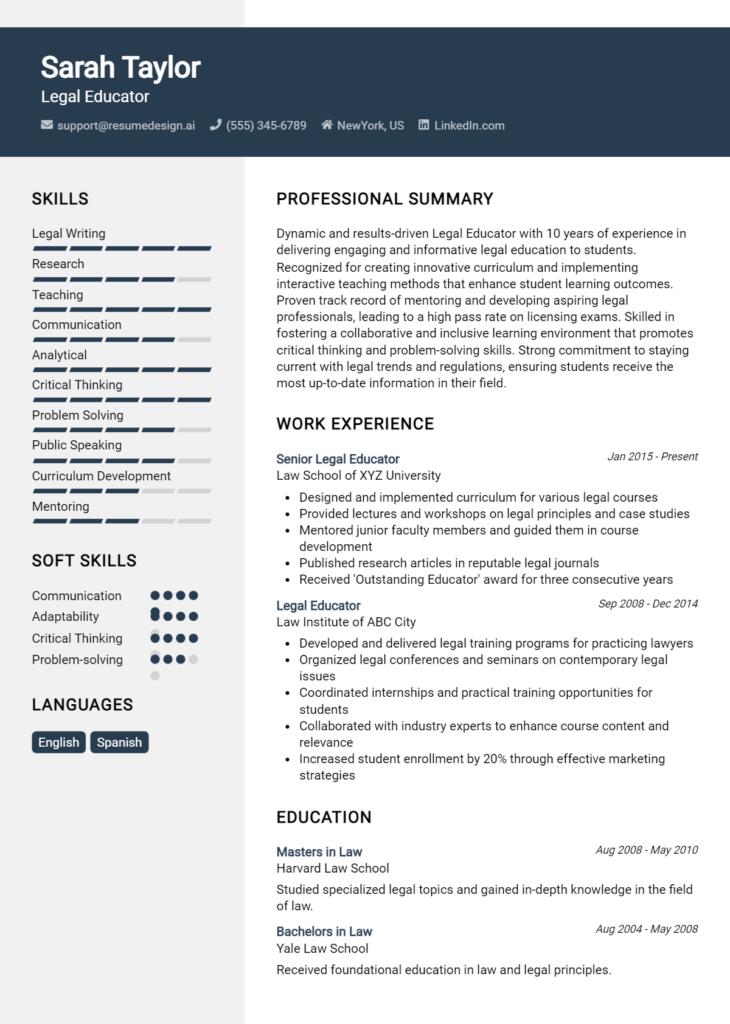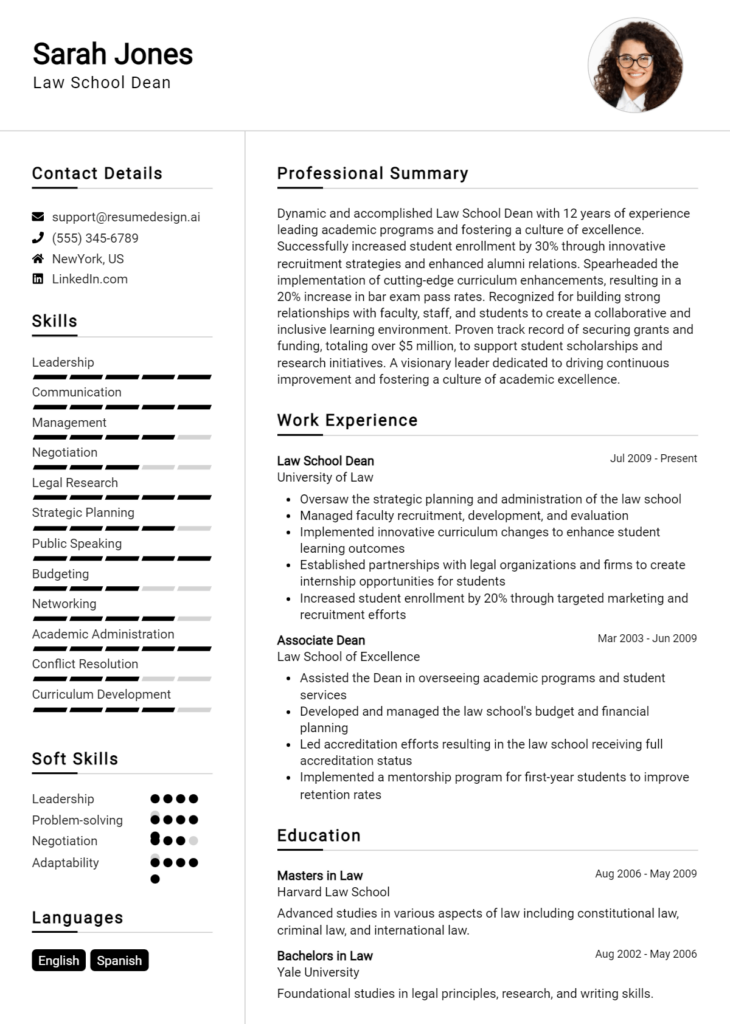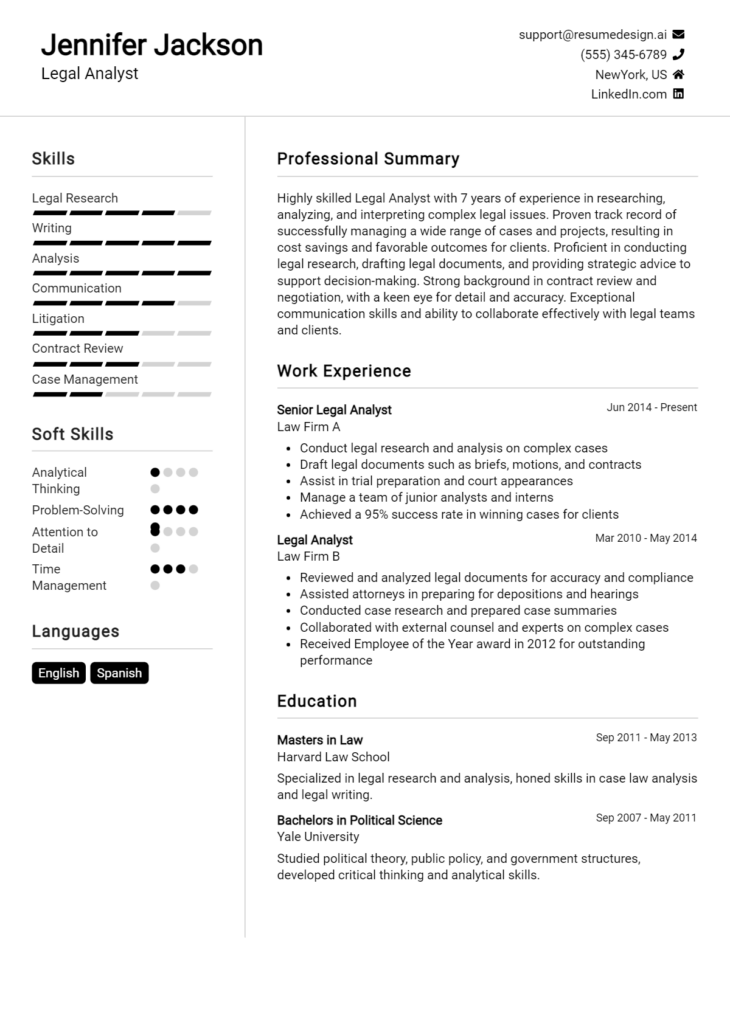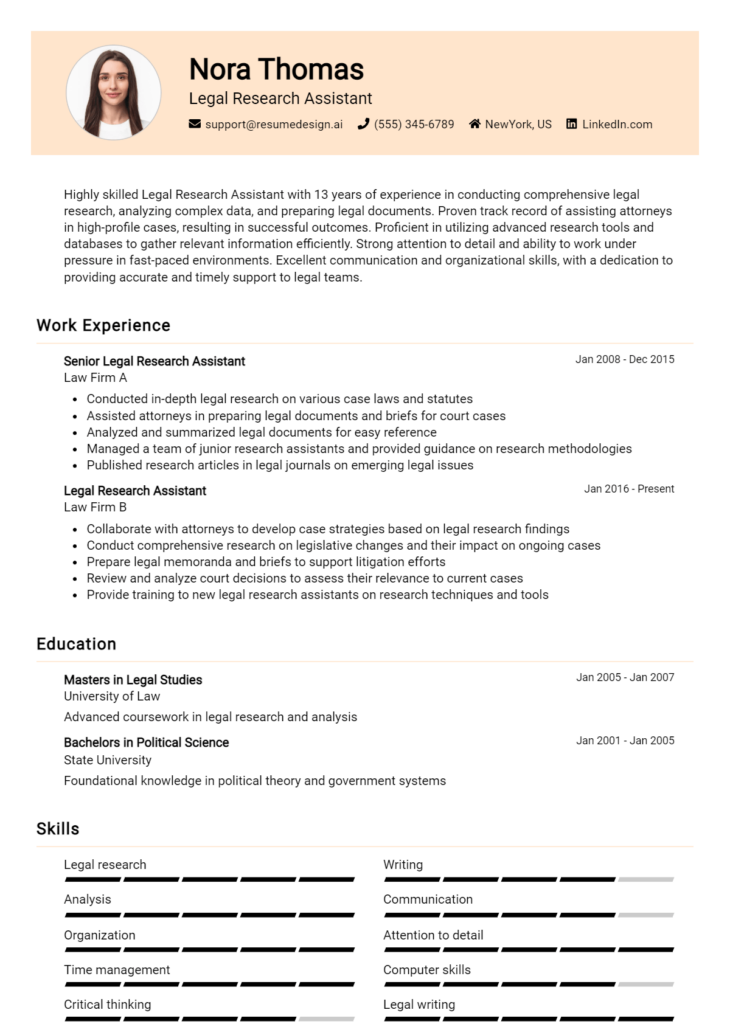Legal Scholar Core Responsibilities
A Legal Scholar plays a pivotal role in bridging various departments, ensuring that legal frameworks align with organizational goals. Key responsibilities include conducting extensive legal research, analyzing case law, and drafting scholarly articles. Essential skills encompass strong analytical abilities, technical knowledge of legal systems, and operational insight to solve complex problems efficiently. These competencies are vital for contributing to the organization’s success, and a well-structured resume can effectively highlight these qualifications.
Common Responsibilities Listed on Legal Scholar Resume
- Conduct comprehensive legal research and analysis.
- Draft and publish scholarly articles on legal topics.
- Review and interpret legislation and regulations.
- Collaborate with interdisciplinary teams for policy development.
- Present findings and recommendations to stakeholders.
- Assist in the preparation of legal briefs and documents.
- Engage in discussions at legal conferences and seminars.
- Mentor students or junior researchers in legal studies.
- Stay updated on legal trends and changes in legislation.
- Evaluate the impact of judicial decisions on policy.
- Provide expert opinions on legal matters to organizations.
- Contribute to curriculum development for legal education.
High-Level Resume Tips for Legal Scholar Professionals
In the competitive field of legal scholarship, a well-crafted resume serves as a critical tool for showcasing your expertise and making a lasting first impression on potential employers. Given that your resume is often the initial point of contact between you and a hiring committee, it must effectively communicate your skills, achievements, and dedication to the legal profession. A strong resume not only highlights your qualifications but also reflects your understanding of the legal landscape. This guide will provide practical and actionable resume tips specifically tailored for Legal Scholar professionals, empowering you to present your best self on paper.
Top Resume Tips for Legal Scholar Professionals
- Tailor your resume to the specific job description by incorporating relevant keywords and phrases.
- Emphasize your educational background, including degrees, certifications, and any specialized legal training.
- Showcase relevant experience, including internships, clerkships, or research positions that highlight your expertise in legal scholarship.
- Quantify your achievements where possible, such as the number of publications, presentations, or contributions to legal journals.
- Highlight industry-specific skills, such as legal research methodologies, writing proficiency, and analytical thinking.
- Include a section for professional affiliations, showcasing memberships in legal organizations or academic societies.
- Utilize a clean and professional format that enhances readability and ensures that key information stands out.
- Incorporate a summary statement that succinctly outlines your career goals and what you bring to the table as a legal scholar.
- Keep your resume concise, ideally one page, while ensuring that it contains all pertinent information without unnecessary detail.
By implementing these tips, you can significantly enhance the effectiveness of your resume, increasing your chances of landing a coveted position in the Legal Scholar field. A focused and well-presented resume not only showcases your qualifications but also demonstrates your commitment to excellence in legal scholarship, making you a more attractive candidate to potential employers.
Why Resume Headlines & Titles are Important for Legal Scholar
In the competitive field of legal scholarship, a well-crafted resume headline or title serves as a powerful tool to capture the attention of hiring managers and academic committees. A strong headline succinctly encapsulates a candidate's key qualifications and areas of expertise, allowing them to stand out amidst a sea of applicants. It should be concise, relevant, and directly aligned with the specific role being applied for, offering a clear snapshot of what the candidate brings to the table. An impactful headline not only draws the reader in but also sets the tone for the rest of the resume, making it essential for legal scholars to invest time in crafting a compelling introduction to their professional narrative.
Best Practices for Crafting Resume Headlines for Legal Scholar
- Keep it concise: Aim for a headline that is no longer than a single sentence.
- Be specific: Tailor the headline to reflect the particular legal field or area of expertise.
- Highlight key strengths: Focus on unique skills or accomplishments that differentiate you from other candidates.
- Use strong action words: Incorporate dynamic verbs that convey your experience and impact.
- Align with the job description: Ensure the headline resonates with the requirements of the position.
- Avoid jargon: Use clear language that can be easily understood by a broad audience.
- Revise for impact: Reassess and refine your headline until it clearly communicates your value.
- Consider including credentials: If applicable, include notable degrees or certifications that enhance your credibility.
Example Resume Headlines for Legal Scholar
Strong Resume Headlines
"Experienced Legal Scholar Specializing in International Human Rights Law"
"Published Author and Researcher in Constitutional Law with 5+ Years of Teaching Experience"
"Dynamic Legal Educator with Expertise in Environmental Law and Policy Reform"
Weak Resume Headlines
“Lawyer Looking for Opportunities”
“Legal Professional”
The strong headlines are effective because they immediately communicate the candidate's specific expertise and experience, making it clear what they can contribute to a prospective employer or academic institution. They use precise language that resonates with the target audience and reflect the applicant's unique qualifications. In contrast, the weak headlines fall short as they are overly generic and fail to convey any meaningful information about the candidate's capabilities or focus. This lack of specificity makes it challenging for hiring managers to gauge the applicant's fit for the role, resulting in missed opportunities for both the candidate and the employer.
Writing an Exceptional Legal Scholar Resume Summary
A well-crafted resume summary is crucial for a Legal Scholar as it serves as the first impression for hiring managers. A strong summary quickly highlights the candidate's key skills, relevant experience, and notable accomplishments, effectively showcasing their suitability for the role. It acts as a hook that draws the reader in, encouraging them to delve deeper into the resume. To be impactful, the summary should be concise and tailored to the specific position the candidate is applying for, ensuring it resonates with the unique requirements of the job.
Best Practices for Writing a Legal Scholar Resume Summary
- Quantify achievements to demonstrate the impact of your work.
- Focus on key skills relevant to the Legal Scholar position.
- Tailor the summary to align with the job description and requirements.
- Use clear and concise language that is easy to understand.
- Highlight specific areas of expertise, such as legal research or policy analysis.
- Incorporate industry-specific terminology to showcase knowledge.
- Showcase any significant publications or contributions to legal scholarship.
- Maintain a professional tone that reflects your academic and practical experience.
Example Legal Scholar Resume Summaries
Strong Resume Summaries
Dynamic Legal Scholar with over 8 years of experience in constitutional law, contributing to landmark cases that shaped state policy. Published 10+ articles in peer-reviewed journals, enhancing legal discourse and advocacy.
Detail-oriented Legal Researcher skilled in utilizing advanced legal databases to support litigation strategies, leading to a 30% reduction in case preparation time for complex civil cases. Proven track record of successful grant proposals totaling over $200,000.
Accomplished Legal Scholar specializing in international human rights law, with extensive experience in policy advocacy and a history of presentations at renowned legal conferences. Successfully influenced legislative change through comprehensive research and collaboration.
Weak Resume Summaries
Legal Scholar with some experience in various legal fields. Interested in furthering my career and contributing to the legal profession.
Experienced in legal research and writing. Looking for opportunities to apply my skills in a legal setting.
The strong resume summaries are considered effective because they are specific, quantifiable, and directly tied to the skills and experiences relevant to the role of a Legal Scholar. They provide clear examples of achievements and areas of expertise that showcase the candidate's qualifications. In contrast, the weak resume summaries lack detail and specificity, making them generic and less compelling, failing to demonstrate the candidate's true potential or relevance to the position.
Work Experience Section for Legal Scholar Resume
The work experience section of a Legal Scholar resume is a critical component that showcases a candidate's technical skills, leadership abilities, and commitment to delivering high-quality outcomes in the field of law. This section provides potential employers with concrete evidence of the candidate's qualifications, demonstrating how previous experiences align with industry standards. By quantifying achievements and clearly articulating responsibilities, candidates can effectively illustrate their expertise, team management capabilities, and contributions to legal scholarship, making a compelling case for their candidacy.
Best Practices for Legal Scholar Work Experience
- Quantify achievements with specific metrics to demonstrate impact.
- Use clear and concise language to describe responsibilities and outcomes.
- Highlight technical skills relevant to legal research and scholarship.
- Include examples of collaborative projects to showcase teamwork abilities.
- Align experiences with industry standards and expectations for legal scholars.
- Tailor the work experience descriptions to the specific job application.
- Incorporate keywords from the job description to enhance relevance.
- Showcase any leadership roles undertaken in research or academic settings.
Example Work Experiences for Legal Scholar
Strong Experiences
- Led a research team in analyzing case law, resulting in a published article that increased citations by 30% in peer-reviewed journals.
- Developed a comprehensive legal database that improved access to materials for over 200 students and faculty, enhancing research efficiency by 40%.
- Collaborated with interdisciplinary teams to create a policy analysis report that influenced state legislation, contributing to a 15% increase in compliance among local agencies.
- Presented findings at national legal conferences, receiving accolades for innovative research methodologies that set new standards in the field.
Weak Experiences
- Worked on various legal projects without specifying contributions or outcomes.
- Assisted in research tasks that did not lead to any publications or recognized contributions.
- Participated in meetings with no details about the impact or results of discussions.
- Gained experience in legal settings without mentioning specific skills or responsibilities.
The examples labeled as strong experiences are characterized by clear, quantifiable outcomes and specific contributions that highlight technical expertise and collaborative efforts. In contrast, the weak experiences lack detail and do not demonstrate a significant impact or leadership, making them less impressive to potential employers. By focusing on measurable achievements and roles in successful projects, candidates can effectively enhance their resumes and appeal to hiring committees in the legal field.
Education and Certifications Section for Legal Scholar Resume
The education and certifications section of a Legal Scholar resume is crucial for showcasing the candidate's academic achievements and professional qualifications. This section not only highlights the foundational knowledge acquired through formal education but also emphasizes any industry-relevant certifications and continuous learning endeavors. By detailing relevant coursework, specialized training, and recognized credentials, candidates can significantly enhance their credibility and demonstrate their commitment to the field. This information aligns the candidate's qualifications with the demands of the role, making a compelling case for their suitability as a Legal Scholar.
Best Practices for Legal Scholar Education and Certifications
- Prioritize relevant degrees in law, legal studies, or related fields.
- Include industry-recognized certifications pertinent to the legal field.
- Detail coursework that aligns with the specific area of legal scholarship.
- Highlight any honors, awards, or distinctions received during your studies.
- List ongoing education or training to show commitment to continuous learning.
- Ensure that all listed qualifications are current and relevant to the position.
- Use clear formatting to improve readability and emphasize key achievements.
- Consider including professional development workshops or seminars attended.
Example Education and Certifications for Legal Scholar
Strong Examples
- Juris Doctor (J.D.), Harvard Law School, 2020
- Certified Legal Research Specialist (CLRS), National Association of Legal Professionals, 2021
- Master of Laws (LL.M.) in International Law, Georgetown University, 2022
- Relevant Coursework: Advanced Legal Writing, Comparative Constitutional Law, and Legal Theory.
Weak Examples
- Bachelor of Arts in English Literature, University of Any State, 2015
- Certification in Basic Computer Skills, Local Community College, 2019
- High School Diploma, Anytown High School, 2011
- Online Course in Creative Writing, Various Platforms, 2021
The examples are considered strong because they directly pertain to the field of legal scholarship, showcasing advanced degrees and certifications that enhance the candidate's qualifications. In contrast, the weak examples reflect educational qualifications and certifications that are either irrelevant or do not contribute to the candidate's expertise in law, failing to align with the expectations for a Legal Scholar role.
Top Skills & Keywords for Legal Scholar Resume
In the competitive field of legal scholarship, possessing the right skills is paramount for success. A well-crafted resume that highlights both hard and soft skills can significantly enhance a candidate's appeal to academic institutions and research organizations. Skills such as analytical thinking, legal research, and communication abilities are essential for navigating the complexities of legal theories and doctrines. By showcasing these competencies effectively, legal scholars can demonstrate their capacity to contribute to the field, engage in impactful research, and educate future generations of legal professionals. Understanding the distinction between hard and soft skills is crucial, as both play a vital role in shaping a well-rounded legal scholar.
Top Hard & Soft Skills for Legal Scholar
Soft Skills
- Analytical Thinking
- Critical Thinking
- Communication
- Problem-Solving
- Collaboration
- Adaptability
- Time Management
- Research Aptitude
- Ethical Judgment
- Presentation Skills
- Negotiation
- Interpersonal Skills
- Leadership
- Attention to Detail
- Creativity
Hard Skills
- Legal Research
- Writing and Editing
- Knowledge of Legal Software (e.g., Westlaw, LexisNexis)
- Understanding of Legal Terminology
- Statutory Interpretation
- Case Analysis
- Knowledge of Jurisprudence
- Data Analysis
- Public Speaking
- Familiarity with Academic Publishing
- Teaching Methodologies
- Policy Analysis
- Legislative Drafting
- Contract Law
- International Law
For a more comprehensive understanding of how to effectively present your skills and work experience, consider highlighting your most relevant qualifications in your resume.
Stand Out with a Winning Legal Scholar Cover Letter
I am writing to express my interest in the Legal Scholar position at [Institution/Organization Name], as advertised. With a robust academic background in legal studies and a passion for advancing legal scholarship, I am eager to contribute my expertise in research, writing, and analysis to your esteemed institution. My experience as a research assistant during my Juris Doctor program has equipped me with the skills necessary to produce high-quality legal research and engage in critical discussions surrounding emerging legal issues.
Throughout my academic career, I have focused on various aspects of law, including constitutional, administrative, and international law. My thesis, which examined the implications of international human rights treaties on domestic legal systems, received high commendation and was published in [Relevant Journal Name]. This experience not only honed my research and writing skills but also deepened my understanding of the interconnectedness of legal frameworks across jurisdictions. I am particularly drawn to [Institution/Organization Name] because of its commitment to innovative legal research and interdisciplinary collaboration.
In addition to my academic pursuits, I have actively participated in numerous legal conferences and workshops, where I presented papers and engaged with leading scholars in the field. My ability to articulate complex legal concepts clearly and persuasively has been recognized by peers and faculty alike. I believe that my proactive approach to scholarship and my dedication to fostering a dynamic academic environment align with the mission of [Institution/Organization Name]. I am excited about the opportunity to contribute to ongoing research projects and collaborate with fellow scholars who are equally passionate about advancing legal knowledge.
I am looking forward to the possibility of discussing how my background, skills, and enthusiasms align with the goals of [Institution/Organization Name]. Thank you for considering my application. I am eager to bring my commitment to legal scholarship to your team and contribute to impactful research that shapes the future of law.
Common Mistakes to Avoid in a Legal Scholar Resume
When crafting a resume as a legal scholar, it's essential to present your qualifications and experience in a way that clearly demonstrates your expertise and suitability for the role. However, many candidates make common mistakes that can detract from their overall presentation and impact. Understanding these pitfalls can help you create a more effective resume that highlights your strengths and achievements.
Lack of Tailoring: Failing to customize your resume for specific positions can make it appear generic. Tailoring your resume to align with the job description demonstrates your interest and attention to detail.
Overloading with Jargon: Excessive use of legal jargon can alienate readers. While some legal terminology is necessary, ensure that your resume remains accessible to those who may not share your specialized knowledge.
Ignoring Formatting Consistency: Inconsistent formatting can make your resume look unprofessional. Use uniform fonts, headings, and bullet points to achieve a polished and cohesive appearance.
Neglecting Research Contributions: Legal scholars often engage in research, but failing to prominently feature these contributions can be a missed opportunity. Highlight publications, presentations, and any collaborative projects to showcase your academic impact.
Excessive Length: A lengthy resume can overwhelm hiring committees. Aim to keep your resume concise, ideally within one to two pages, focusing on the most relevant information.
Omitting Relevant Skills: Not including specific legal skills, such as analytical thinking, critical writing, and research proficiency, can undermine your qualifications. Clearly outline your skill set to demonstrate your competence.
Poorly Structured Sections: Disorganized sections can confuse readers. Ensure your resume follows a logical structure, such as education, experience, skills, and publications, to facilitate easy navigation.
Failure to Proofread: Spelling and grammatical errors can severely damage your credibility. Always proofread your resume multiple times, and consider having a colleague review it as well to catch any mistakes.
Conclusion
In this article, we explored the essential attributes and qualifications that define a successful Legal Scholar. We highlighted the importance of a strong educational background, research experience, and publications in prestigious journals. Additionally, we discussed the significance of networking within academic and legal circles to enhance professional growth and opportunities.
As you reflect on your career trajectory, it's crucial to ensure that your resume effectively communicates your unique qualifications and experiences. A well-crafted resume can set you apart in a competitive field. We encourage you to take action today by reviewing your Legal Scholar Resume. Utilize the following tools to help you create a standout application:
- Access resume templates to structure your resume effectively.
- Use the resume builder for a user-friendly experience in crafting your document.
- Browse through resume examples for inspiration and guidance.
- Don’t forget to complement your resume with a compelling application by utilizing our cover letter templates.
Take the next step in your academic career today!

